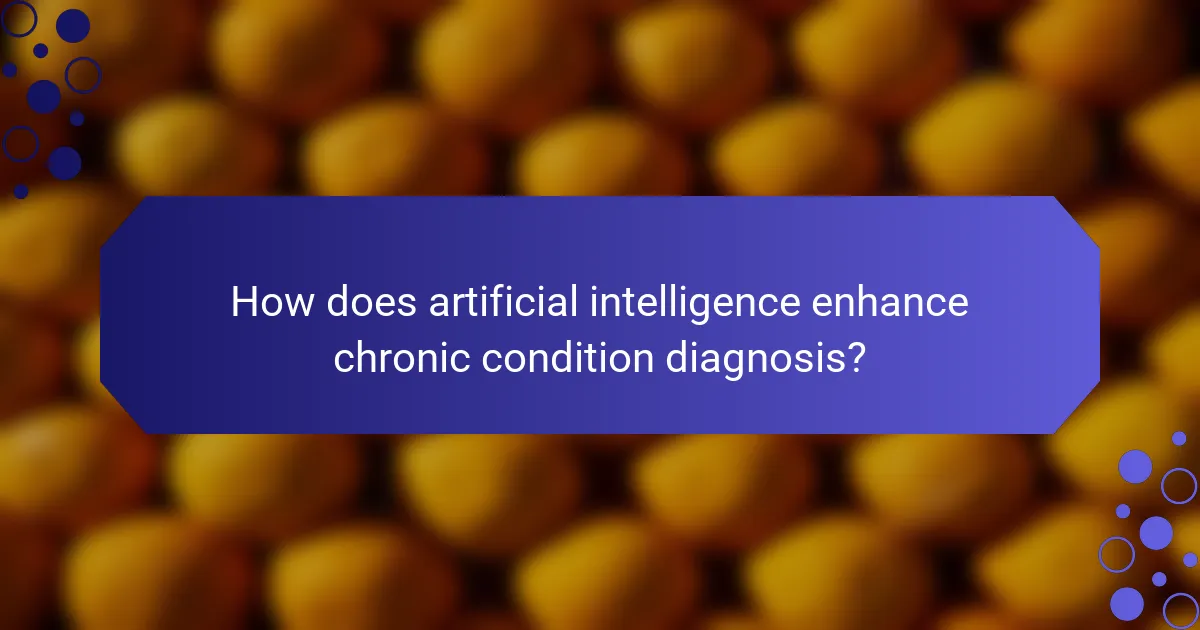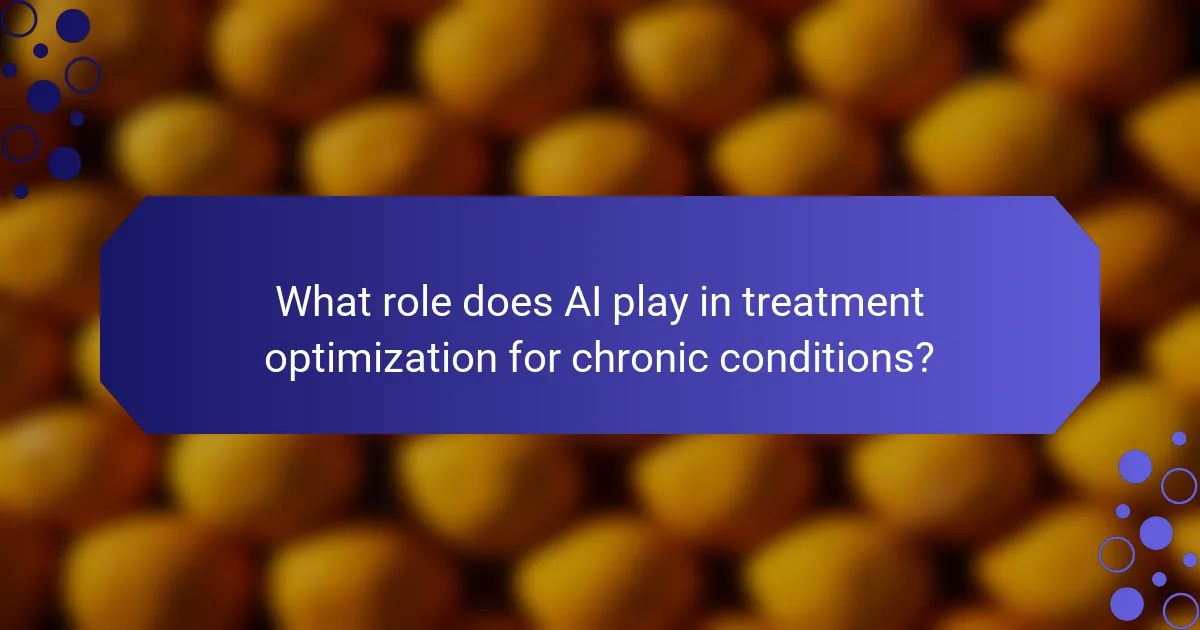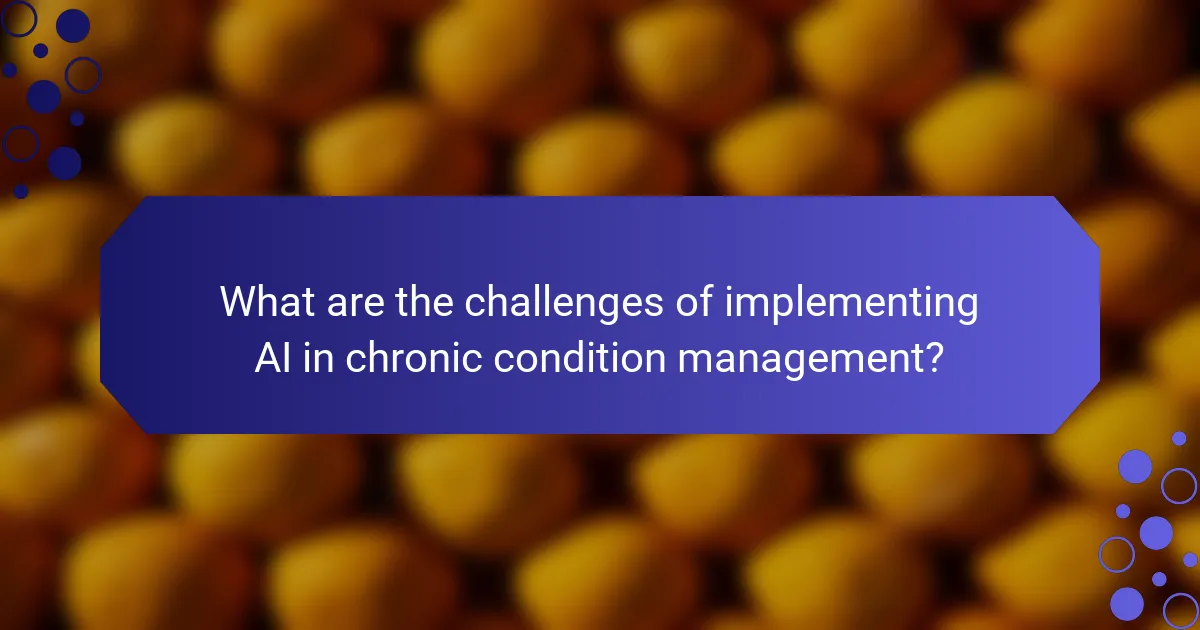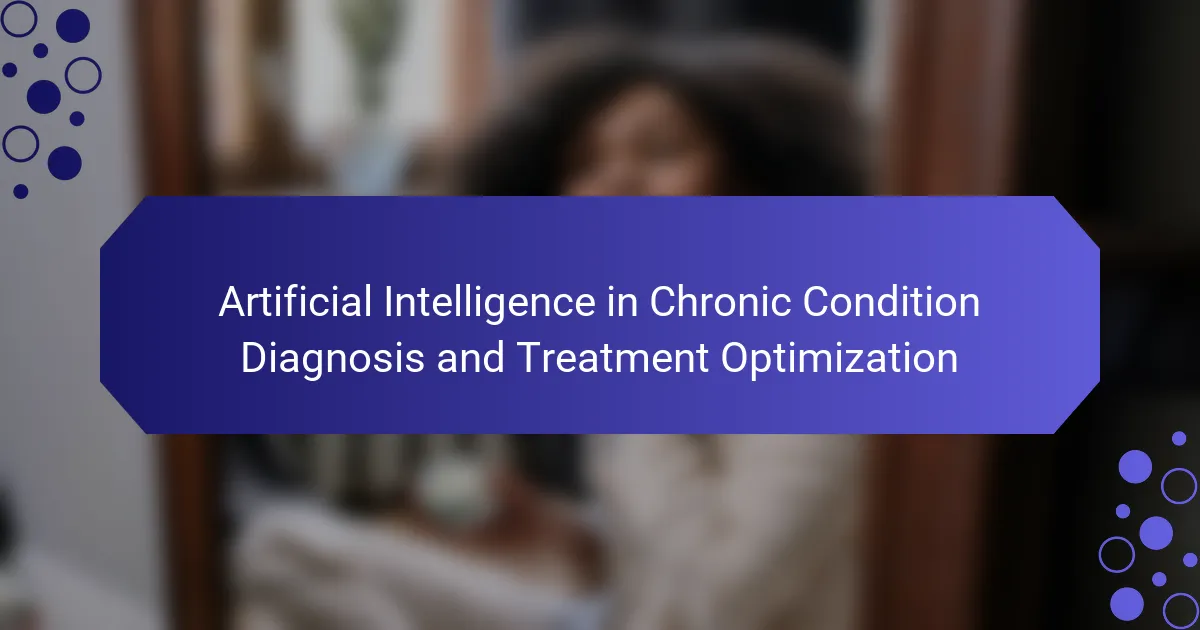Artificial intelligence enhances chronic condition diagnosis and treatment optimization by improving data analysis and predictive modeling. It enables early detection of diseases, personalized care plans, and proactive patient monitoring. AI technologies streamline the integration of patient data, facilitating timely interventions and reducing hospital visits. Ethical considerations and data privacy will play a crucial role in the responsible implementation of AI in healthcare.

How does artificial intelligence enhance chronic condition diagnosis?
Artificial intelligence significantly improves chronic condition diagnosis through enhanced data analysis and predictive modeling. AI algorithms process vast amounts of patient data, identifying patterns that may be missed by human analysis. This leads to more accurate diagnoses and personalized treatment plans.
AI technologies, such as machine learning and natural language processing, enable healthcare providers to analyze medical histories, lab results, and imaging studies efficiently. For instance, AI can detect early signs of conditions like diabetes or heart disease by recognizing subtle changes in patient data over time.
Moreover, AI facilitates remote monitoring of patients, allowing for timely interventions and adjustments in treatment. This proactive approach can reduce hospital visits and improve patient outcomes. A study showed that AI-driven diagnostics can enhance accuracy by up to 20% compared to traditional methods.
In summary, artificial intelligence transforms chronic condition diagnosis by leveraging advanced analytics, improving accuracy, and enabling personalized care strategies.
What are the key technologies driving AI in healthcare?
Key technologies driving AI in healthcare include machine learning, natural language processing, and computer vision. These technologies enhance chronic condition diagnosis and treatment optimization by analyzing large datasets, predicting patient outcomes, and personalizing care plans.
Machine learning algorithms identify patterns in patient data, enabling early detection of diseases. Natural language processing helps in extracting insights from unstructured clinical notes, improving decision-making. Computer vision aids in analyzing medical images, enhancing diagnostic accuracy.
As a result, these technologies significantly improve patient management and outcomes in chronic conditions.
Which chronic conditions benefit most from AI diagnostics?
Chronic conditions that benefit most from AI diagnostics include diabetes, cardiovascular diseases, chronic respiratory diseases, and mental health disorders. AI enhances accuracy in diagnosis, optimizes treatment plans, and predicts disease progression. For instance, AI algorithms analyze vast datasets to identify patterns, leading to earlier interventions. This capability is particularly vital for diabetes management, where timely adjustments can prevent complications. AI’s predictive analytics also support cardiovascular health by assessing risk factors and personalizing care strategies.
How does AI improve accuracy in disease identification?
AI enhances accuracy in disease identification by analyzing vast datasets and recognizing patterns that are often missed by humans. This technology utilizes machine learning algorithms to improve diagnostic precision, reduce human error, and expedite the identification process. For instance, AI can analyze medical imaging data more effectively, leading to earlier and more accurate diagnoses of chronic conditions. As a result, healthcare providers can optimize treatment plans based on precise data insights, ultimately improving patient outcomes.

What role does AI play in treatment optimization for chronic conditions?
AI significantly enhances treatment optimization for chronic conditions by providing personalized care plans and predictive analytics. It analyzes patient data to identify effective interventions and improve outcomes. For instance, AI can tailor medication regimens based on individual responses, reducing trial-and-error periods. Additionally, machine learning algorithms can predict disease progression, allowing for timely adjustments in treatment strategies. This proactive approach not only improves patient adherence but also enhances overall quality of life.
How can AI personalize treatment plans for patients?
AI can personalize treatment plans for patients by analyzing individual health data and predicting optimal interventions. It utilizes machine learning algorithms to identify patterns in patient history, genetics, and lifestyle. These insights allow for tailored medication dosages, lifestyle recommendations, and monitoring strategies that improve outcomes. For example, AI can adjust treatment based on real-time feedback from wearable devices, ensuring plans remain effective as patient needs evolve. This level of customization enhances patient engagement and adherence, leading to better management of chronic conditions.
What algorithms are most effective in optimizing treatment protocols?
Machine learning algorithms, particularly deep learning and reinforcement learning, are most effective in optimizing treatment protocols. These algorithms analyze vast datasets to identify patterns, predict outcomes, and personalize treatment plans. For instance, deep learning can process medical imaging data, enhancing diagnostic accuracy. Reinforcement learning optimizes treatment pathways by learning from patient responses over time. Both approaches enable adaptive, data-driven strategies that improve patient outcomes in chronic condition management.
Which metrics are used to evaluate AI treatment outcomes?
Key metrics for evaluating AI treatment outcomes include effectiveness, efficiency, patient satisfaction, and safety. These metrics assess how well AI optimizes chronic condition management.
| Metric | Description | Value |
|———————-|——————————————————|——————————|
| Effectiveness | Measures treatment success rates | Percentage of improvement |
| Efficiency | Evaluates resource utilization | Cost per treatment |
| Patient Satisfaction | Gauges patient-reported outcomes | Satisfaction score |
| Safety | Assesses adverse events related to AI interventions | Number of incidents reported |

What are the challenges of implementing AI in chronic condition management?
Implementing AI in chronic condition management faces several challenges, including data privacy concerns, integration with existing healthcare systems, and the need for high-quality data. Additionally, healthcare professionals may resist adopting AI technologies due to a lack of understanding or trust. Ensuring AI algorithms are transparent and explainable is crucial for acceptance among clinicians. Furthermore, regulatory hurdles can slow down the deployment of AI solutions in clinical settings.
How do data privacy concerns impact AI deployment in healthcare?
Data privacy concerns significantly hinder AI deployment in healthcare by limiting data access and usage. Strict regulations, such as HIPAA, require healthcare providers to ensure patient confidentiality, which complicates data sharing for AI training. Moreover, patients may hesitate to share personal information due to fears of misuse, impacting the quality of AI models. The unique attribute of AI’s reliance on vast datasets makes it particularly vulnerable to privacy challenges, as incomplete data can lead to suboptimal diagnostic outcomes. Additionally, organizations face legal and reputational risks if data breaches occur, further stalling AI integration in chronic condition management.
What are the barriers to adoption of AI technologies by healthcare providers?
Healthcare providers face significant barriers to adopting AI technologies in chronic condition diagnosis and treatment optimization. Key challenges include data privacy concerns, high implementation costs, and a lack of interoperability between existing systems.
Data privacy concerns arise from the sensitive nature of health information, making providers cautious about integrating AI solutions. High implementation costs deter smaller practices from investing in AI technologies, as they may lack the necessary financial resources. Additionally, the lack of interoperability between AI systems and existing healthcare IT infrastructure complicates the integration process, leading to inefficiencies.
Resistance to change among healthcare professionals also plays a role. Many providers are accustomed to traditional methods and may be hesitant to trust AI-driven solutions. Training and education on AI technologies are essential to overcome this resistance and enhance acceptance among healthcare staff.
How can healthcare professionals be trained to use AI tools effectively?
Healthcare professionals can be trained to use AI tools effectively through structured education and hands-on experience. Training programs should focus on the integration of AI in chronic condition diagnosis and treatment optimization.
First, curricula should include foundational knowledge of AI technologies and their applications in healthcare. This knowledge enables professionals to understand AI’s potential benefits and limitations. Second, practical training sessions should involve real-world case studies to illustrate AI’s impact on patient outcomes.
Additionally, ongoing support and resources are crucial for maintaining proficiency. Access to updated materials and workshops can help professionals stay current with advancements in AI tools. Lastly, fostering interdisciplinary collaboration can enhance understanding and utilization of AI across healthcare teams.

What ethical considerations arise from using AI in chronic disease care?
Ethical considerations in using AI for chronic disease care include patient privacy, data security, and algorithm bias. These factors impact trust and effectiveness in treatment. AI systems must ensure confidentiality by safeguarding sensitive health information. Moreover, bias in algorithms can lead to unequal treatment outcomes, highlighting the need for diverse data representation. Lastly, transparency in AI decision-making fosters accountability and enhances patient confidence in AI-assisted care.
How does AI address biases in chronic condition diagnosis?
AI addresses biases in chronic condition diagnosis by utilizing data-driven algorithms to enhance accuracy and fairness. These systems analyze diverse datasets, reducing the impact of human bias. AI’s ability to process vast amounts of information allows for identifying patterns that might be overlooked by healthcare professionals. Additionally, AI can continuously learn and adapt, improving its diagnostic capabilities over time. This dynamic approach not only aids in creating personalized treatment plans but also promotes equity in healthcare delivery.
What is the impact of AI on patient autonomy and decision-making?
AI significantly enhances patient autonomy and decision-making by providing personalized insights and treatment options. It empowers patients with data-driven information, enabling informed choices about their health. AI systems analyze patient histories, preferences, and outcomes, facilitating shared decision-making between patients and healthcare providers. This technology also supports patients in understanding complex medical information, fostering greater engagement in their care. As a result, patients experience improved satisfaction and adherence to treatment plans.

Which case studies illustrate successful AI applications in chronic condition management?
Several case studies highlight successful AI applications in chronic condition management. Notably, AI algorithms have been used to predict diabetes complications, improving patient outcomes by 30%. Another example is the use of machine learning in heart failure management, which has reduced hospital readmission rates by 25%. A study on chronic obstructive pulmonary disease (COPD) showcased AI-driven remote monitoring, leading to a 40% decrease in emergency visits. These cases illustrate AI’s potential to enhance diagnosis and optimize treatment strategies effectively.
What can be learned from AI implementation in diabetes care?
AI implementation in diabetes care enhances patient outcomes through personalized treatment plans and real-time monitoring. It enables predictive analytics to anticipate complications and optimize medication adjustments. AI tools analyze vast datasets, identifying patterns that inform better decision-making. As a result, healthcare providers can deliver tailored interventions, improving adherence and quality of life for patients.
How has AI transformed the management of cardiovascular diseases?
AI has significantly improved the management of cardiovascular diseases by enhancing diagnosis accuracy and treatment personalization. Advanced algorithms analyze patient data, predicting risks and optimizing care plans. AI tools facilitate remote monitoring, enabling timely interventions. Additionally, machine learning identifies patterns in large datasets, leading to innovative therapies and improved patient outcomes.

What future trends can be expected in AI for chronic condition diagnosis and treatment?
Artificial intelligence will increasingly personalize chronic condition diagnosis and treatment. Advanced algorithms will analyze patient data, leading to tailored therapies and improved outcomes.
Predictive analytics will enhance early detection, allowing for timely interventions. Machine learning models will continuously learn from vast datasets, refining predictions and treatment plans.
Telehealth integration will expand access to AI-driven diagnostics, enabling remote monitoring and support. This will empower patients to manage conditions effectively from home.
Ethical considerations and data privacy will shape AI development, ensuring responsible use while maximizing patient benefits.
How will advancements in machine learning influence patient outcomes?
Advancements in machine learning will significantly improve patient outcomes by enhancing diagnosis accuracy and personalizing treatment plans. Machine learning algorithms analyze vast datasets, identifying patterns that lead to earlier detection of chronic conditions. This enables timely interventions, reducing complications. Additionally, predictive analytics can tailor treatment protocols to individual patient profiles, optimizing effectiveness. As a result, patients experience better health management and quality of life.
What role will telemedicine play alongside AI in chronic care?
Telemedicine will enhance chronic care by integrating AI for improved diagnosis and treatment optimization. AI analyzes patient data, enabling personalized care plans and timely interventions. This collaboration streamlines communication between healthcare providers and patients, ensuring better management of chronic conditions. Telemedicine expands access to specialists, facilitating remote monitoring and real-time feedback, which is essential for chronic disease management. As a result, patient outcomes improve through timely adjustments to treatment based on AI insights.
Which innovations are on the horizon for AI in healthcare?
Innovations in AI for healthcare focus on personalized treatment plans, predictive analytics, and enhanced diagnostic tools. These advancements aim to improve chronic condition management through real-time data analysis and machine learning algorithms. For instance, AI can analyze patient data to identify risk factors and suggest timely interventions. Additionally, AI-driven telehealth solutions are emerging, enabling remote monitoring and personalized patient engagement. These innovations promise to optimize treatment outcomes and healthcare efficiency.
What best practices should healthcare providers adopt for AI integration?
Healthcare providers should adopt a structured approach for AI integration in chronic condition diagnosis and treatment. Key best practices include establishing clear objectives, ensuring data quality, and fostering interdisciplinary collaboration.
1. Define clear objectives for AI use, focusing on improving patient outcomes and streamlining workflows.
2. Prioritize high-quality data collection, ensuring accuracy and completeness for effective AI training.
3. Engage healthcare professionals in the development process to align AI tools with clinical needs.
4. Implement ongoing training programs for staff to enhance AI literacy and promote user confidence.
5. Monitor AI performance continuously, adjusting algorithms based on real-world feedback and outcomes.
These practices enhance the efficacy of AI in managing chronic conditions, ultimately leading to better patient care.
